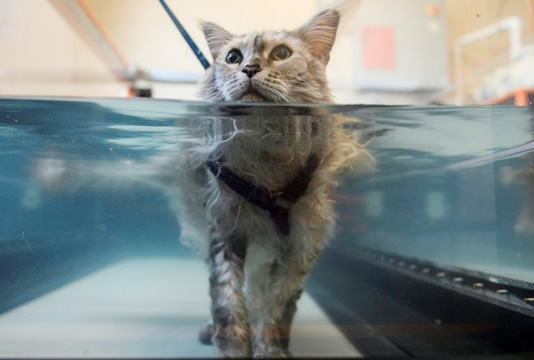WASHINGTON, Aug 4, 2019 (BSS/AFP) – Eleven-year-old Bess waits patiently
to be immersed in water just a little cooler than her body temperature.
Her hydrotherapy session will last only 17 minutes but it does wonders for
this arthritis sufferer. Bess is a cat.
To ease her joint pain, the Maine Coon, a touch overweight at 21 pounds
(10 kilograms), is taken every week to the Friendship Hospital for Animals, a
veterinary clinic on a pleasant Washington street.
Beyond traditional veterinary treatment, the clinic offers forms of care
once reserved for humans, such as acupuncture and therapeutic ultrasound.
Pets are now increasingly seen as genuine family members, said Christine
Klippen, one of the 63 veterinarians who are available at the clinic every
day of the year.
And this is particularly true for millennials, she said, who see
themselves as moms and dads to their “fur babies.” Given the higher incomes
in the US capital, they often seek out the best pet care available.
In the United States, 84.9 million households, or 68 percent, have a pet,
according to Steve King, head of the American Pet Products Association.
“Millennials are the largest pet-owning demographic among all
generations,” he said, and have surpassed the postwar Baby Boom generation.
Last year, consumer spending on pets hit a record $72.6 billion and the
APPA expects this will rise to $75.4 billion in 2019.
Health care spending is the fastest-rising category as pet owners learn
about available treatments.
“There’s less pushback than there was,” said Brant Hassell, a veterinarian
practicing at the District Veterinary Hospital.
“These dogs are a lot of people’s first children,” he said.
“If I say, ‘Oh, my goodness. This dog has a loose tooth,’ they’re just
like, ‘my baby!'”
Back at Friendship Hospital, Bess the cat walks on an underwater
treadmill, the water up to her whiskers, the pace slow and regular as a
metronome.
But to keep up, Bella, a “senior” dog, needed a little extra motivation in
the form of peanut butter.
“We are more selective with food when they’re overweight,” said Janay
Austin-Carlson, a rehabilitation practitioner.
Walking in water creates greater resistance to movement, making exercise
more effective.
“One minute in here is much harder than one minute outside,” she said.
Given Washington’s often oppressive summertime heat, where temperatures can
easily hit 95 degrees Fahrenheit (35 degrees Celsius) and humidity rises to
70 percent, the animals can also exercise in relative comfort.
“We can play with the speed, the water level,” said Austin-Carlson. “All
those things create different dynamics.”
– $15,000 for dialysis –
Bella’s “mom,” 45-year-old Freya Jackson, says hydrotherapy has been a
godsend.
“When she comes, she’s usually tired afterwards and needs a long nap. But
the day after you can really see she could move around more freely,” said
Jackson.
Still, Bella’s fitness regime is not exactly free: A 20-minute
hydrotherapy session runs to $89 and comes after 15 minutes of laser therapy
at $65.
And Bella has stuck to this weekly routine for a year.
Jackson said having a healthy dog helps her own exercise habits and, given
that she has no children, the expense fits her budget.
“I’m investing in myself to stay fit and healthy and be able to run
around,” she said. “It is a part of my wellbeing.”
Pet owners are generally healthier people, coping better with conditions
such as autism, dementia and cardiovascular disease, according to studies
funded by the Human Animal Bond Research Institute.
Having a dog or cat in the house typically lowers blood pressure and
children may suffer less frequently from allergies.
Generally pets improve mental health, according to Klippen of the
Friendship Hospital.
“Because we view our pets in a more human way it is no longer meaningful
enough for us to simply give them a biscuit,” said King of the APPA.
And some pet owners are ready to spare no expense: Dialysis can run
between $12,000 and $15,000 while the price tag on orthopedic surgery ranges
from $5,000 to $7,000.
But humanizing pets can involve controversial or even dangerous health
practices such as needlessly imposing grain or gluten free diets on animals.
This simply does not suit their nutritional needs and can cause premature
death, according to Klippen.
In the meantime, US authorities say they have begun scrutinizing potential
ties between such popular, newfangled diets and the prevalence of heart
disease in dogs.



